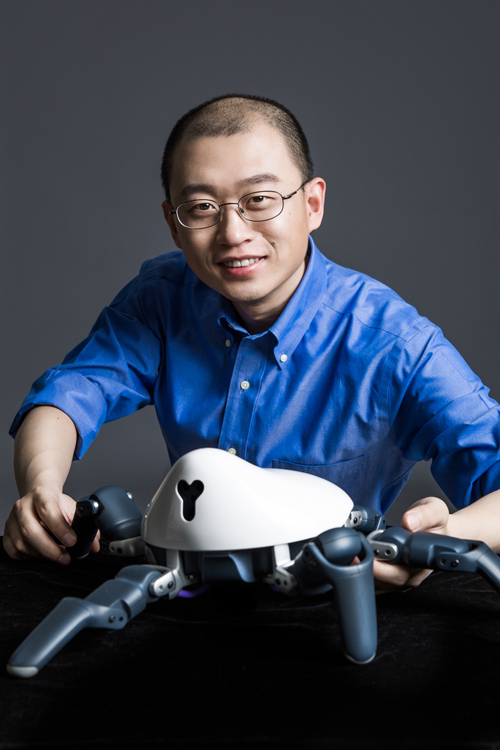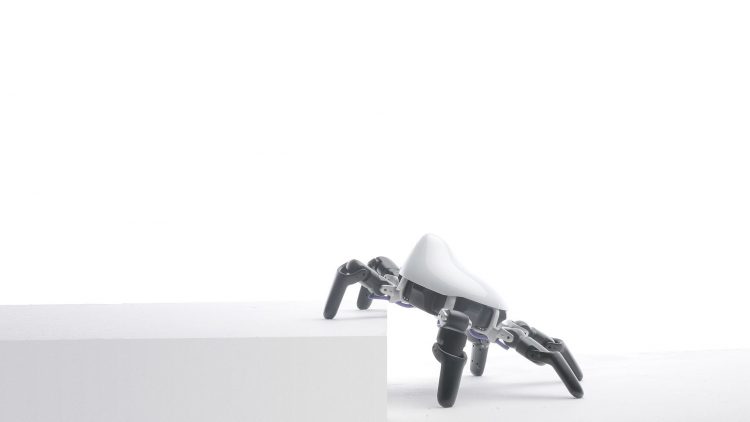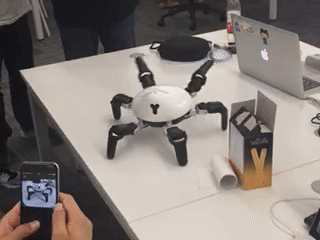
Alert – hostile agent! Photo credit: Vincross.
Since he was young, Sun Tianqi has always wanted to create life. “Creating a living being is a power that only God has,” he told me. “Humans cannot create organisms.”
But that’s exactly what his robotics startup Vincross aims to do.
The Beijing-based startup’s first product, a six-legged robot called HEXA, will be Vincross’s first attempt. Reminiscent of a tarantula, HEXA is an all-terrain robot that can navigate through different environments using lasers. It also supports various machine learning algorithms and image, video, face, and voice recognition, which means it can inch around precipices, avoid falling off a table, and recognize who you are.
“My research on artificial intelligence, neuroscience, neural modeling, and later on, machine learning – all of it centered around one thing,” he says. “I wanted to create a creature.”
Tianqi isn’t a typical computer scientist. Before founding Vincross in 2014, Tianqi studied mice, specifically how decision-making manifested itself in their neural signals. At Tsinghua University, he created a virtual reality maze for mice, tricking them into believing that they were running into walls, avoiding dead-ends, and eating food.
Before that, Tianqi was a computer science major. He discovered Alan Turing during his undergraduate years and fell in love with Turing’s work. He spent an entire year translating the Turing biography Enigma of Intelligence into Chinese.
“As his disciple, I felt like I should do something for him,” Tianqi told Tech in Asia.
Turing wasn’t Tianqi’s only role model. He named his startup after another idol, Leonardo Da Vinci. Vincross is a portmanteau of Vinci and crossbow, the latter a reference to a Da Vinci invention.
“I discovered that AI had a lot of interesting philosophical questions,” says Tianqi. “So during college, I temporarily left the technological side [of AI] to study philosophy.”

Sun Tianqi, founder and CEO of Vincross. Photo credit: Vincross.
Human sacrifice
Humanism is one of the main drivers behind Vincross’s robotic endeavors. For example, Tianqi believes that robots can offer humanity value in exactly three different areas, one being the prevention of human sacrifice.
“Arguing whether we should sacrifice one or five people will always be wrong,” says Tianqi. “The right answer is that we can sacrifice robots, not any humans.”
He’s referring to the trolley problem, a well-known ethics thought experiment where you can save one person and kill five people, or save five people and kill one person. Tianqi believes that good robots can render such ethical dilemmas – where humans are sacrificed for the good of society – obsolete.
For example, firefighters should not have to risk their lives to save other people’s lives, he says. In fact, Vincross is currently working with the Chinese government to build a custom HEXA robot for firefighting, according to Tianqi. Instead of sending in a human to scope out a burning building, HEXA will explore the environment and make sure that firefighters know where the exits are beforehand.
Robots should also be used to help humans explore the world and universe, says Tianqi. “We are curious about everything,” he says. “We’re curious about the sun, about Mars – we’re curious about the depths of the ocean. To everything on Earth, we want to know why.”

Photo credit: Vincross.
He believes that people like Elon Musk are wrong when they say that others must be prepared to die on the journey to Mars. Robots can be an extension of humanity, letting humans see farther and expand their understanding of the universe without having to die for it, he says.
Finally, robots can become humanity’s “best friend,” says Tianqi. When I give him a flippant look – I thought of Her and Lars and the Real Girl – he mentions Aibo, a robotic dog that Sony made and sold in the early 2000’s. It left such a deep impact among its owners in Japan that many held funerals for their “deceased” Aibo robots once Sony stopped offering repair services.
“We don’t want to create robots that help humans be lazy,” says Tianqi. “So we won’t make robots that sweep the floor or wash dishes.”
On the topic of malevolent robots, Tianqi is, unsurprisingly, optimistic. “New technology always creates problems that we never could have predicted,” he admits. But who’s to say that HEXA couldn’t be used to counter bad robots or even evil users of HEXA?
Though Tianqi himself once had negative thoughts about robots such as DJI’s drones, he believes that most security issues can be avoided with the most basic of safeguards – such as HTTPS connections. Companies just have to care enough to implement them, he says. Vincross will do its best to create safe robots, but anything is possible.
Human mentors

HEXA doing a little dance in front of its creators. Photo credit: Vincross.
To make sure that HEXA develops quickly, Vincross is open-sourcing its software to developers. The robot comes with a few ready-made programs on it, which are called “Skills,” not apps. “A Skill is similar to a smartphone app. But we see robots as living beings, so their app is called a Skill,” explains Tianqi.
For example, one of the pre-installed Skills is ‘explore,’ which lets you see the world through HEXA’s eyes and control it remotely through your smartphone. There’s also ‘home’, which lets users utilize HEXA’s infrared light to control household appliances like the air conditioner or TV through IFTTT (if this, then that) commands. Developers will be able to write their own Skills using the programming language Go.
“We don’t want our first batch of HEXA robots to be sold to a very rich man who gives it to his son to play with,” emphasizes Tianqi. “We don’t want to go to a store to buy one and put it in front of their shop to attract customers either.”
Vincross wants to make sure that only developers that really care about robotics will receive the first batch of HEXA bots. The company has created an elite developer community called the “2048 Human Mentors” group, where developers can discuss robotics and give feedback that will be incorporated into the next generation of HEXA. In order to become part of the 2048 club, developers have to fill out a lengthy survey on Vincross’s website.
The startup also plans to launch HEXA on Kickstarter by late November, with a price tag of US$999 per robot. So far, Vincross has raised US$7 million, which includes a US$6 million series A from GGV Capital – announced last week – and a US$1 million round of seed funding from ZhenFund.
This post This founder used to make VR mazes for mice. Now he’s trying to create life from scratch appeared first on Tech in Asia.
from Tech in Asia https://www.techinasia.com/vincross-profile
via IFTTT
No comments:
Post a Comment